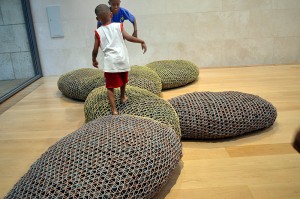I think a lot about how outcomes can be deceiving. What I mean by this is that a beautiful work of art is sometimes not so beautiful in the making. How many times have we heard about a director sexually abusing his cast in the process of making a great movie, or intern/assistant labor being exploited in the process of creating a million dollar artwork? Too many.
I think about the types of values that we promote when we celebrate an outcome but fail to examine what goes into achieving that outcome. I think about this especially in the context of arts-based placemaking, creative action, or whatever people are calling it these days. Creative placemaking is seductive because its aesthetic products paint us a picture of a community bound in harmony through art, a representation of joy, love, and justice.
But are we merely creating representations, or are we enacting them? I believe that community-based artwork is more than a representation, and therefore more than just what an audience sees on the surface. In order to promote an image of a just world, we must also act justly in the steps we take to create this image.
Initiating processes of self-organization and justice can be difficult and takes months, years to do in a community. It requires listening, humility, self-education, and changing course when you discover you’re wrong. I find often that a commitment to process does not align with the demands of a public audience, or of grant funders. Grant applications often require concrete project outcomes in order to meet the terms of the grant. However, because of the time it takes between applying for the grant and receiving the grant, project outcomes could change drastically because communities are fluid, not stagnant – especially vulnerable communities. Additionally, because of the financially strapped nature of community-engaged work, significant groundwork cannot begin until the receipt of the grant. An outcome-based funding model, in my opinion, is a significant barrier to understanding and respecting continuous, invisible processes of self-organization and justice.
I understand the need for a public understanding of what happens in a creative placemaking project, and at the same time it only tells a small percentage of the processes that happen within a community. How do we support the invisible labor of process and how do we also create accountability within process? How do we reorient our funding structures to support process over outcome?
I have no answers but I invite you to question with me.


Deep resounding YES to these questions. Thank you, Carol, for this beautiful articulation.